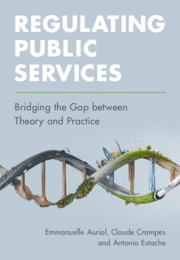‘This superb book brings together – in a rigorous and pedagogical way – the academic knowledge and real-world challenges and solutions to the regulation of sectors that constitute an essential part of our economies. In our politically and socially uncertain times, it is particularly useful in thoroughly addressing the efficiency, equity and political acceptability of regulatory systems, as well as their fiscal and institutional constraints.'
Mathias Dewatripont - Professor of Economics, Université Libre de Bruxelles and Honorary Vice-Governor, National Bank of Belgium
‘There are few books on utility regulation that are useful to practitioners and academics alike. This book is a much needed exception. It provides a thorough treatment of the conceptual and practical issues faced by regulators and policymakers, including the need to address institutional and political considerations with examples from developed and developing countries.'
Andrés Gómez-Lobo - Professor of Economics, Department of Economics, Universidad de Chile,Minister of Transport and Telecomunications of Chile (2014-17)
‘This extraordinary book should be read by everyone serious about the theory and practice of economic regulation. The authors present the main results from the economic theory of regulation clearly and connect them to a wide range of real issues. This unique breadth should enable graduate students and regulators alike to see what economic theory can and – so far at least – cannot contribute to resolving policy issues. Its lessons should make regulators more careful and economic theorists more willing to tackle important but difficult problems.'
Richard Schmalensee - Emeritus at the Sloan School of Management and at the Department of Economics at the Massachusetts Institute of Technology (MIT)
‘This is a powerful and timely book that examines topical industries of public interest, and how to control their power through the lenses of economic regulation, without forgetting institutional, legal, and political considerations. Offering perspectives through both the microscope and the telescope, the book constantly revolves around the three pillars of efficiency, equity, and financial sustainability. The authors are in the unique and authoritative position to write on the theory and practice of regulation based on their experience. A truly fascinating and engaging book that should be read not only by students and scholars interested in the regulation of industries, but also by every person who is concerned with the future of public services.'
Tommaso Valletti - Head of the Department of Economics and Public Policy, Imperial College London, Chief Competition Economist, European Commission (2016-2019)
‘… an excellent book. It is well written, it covers a lot of ground and it is sensibly organised.’
Nils-Henrik M. von der Fehr
Source: Economics of Energy & Environmental Policy



